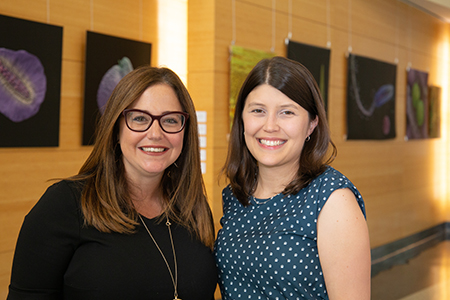Treatment Together
Study Explores Benefits of Addressing Undiagnosed Parental ADHD For Children With the Disorder
A new University of Maryland-led study is screening parents along with their children for attention deficit hyperactivity disorder (ADHD) to determine whether addressing an often-untreated mental health issue in caregivers also translates to better outcomes for children.
Previous research shows that parental ADHD, present in 25 to 50% of families of children with ADHD, interferes with effective parenting and predicts poor child developmental and behavioral treatment outcomes. Funded by a $7 million National Institutes of Mental Health grant, UMD researchers are now working with pediatricians at Children’s National Health System pediatric satellite clinics and researchers elsewhere to throw a wrench into this intergenerational cycle.
In an approach unique to this study, the parents of children who are screened for emotional and behavioral problems at their annual well-child visit will be assessed for their own mental health problems, in particular ADHD.

“We are taking this approach because we recognize that untreated parental mental health challenges can influence the home environment and the child’s functioning over time,” said psychology Professor Andrea Chronis-Tuscano, principal investigator for the study. “Screening in primary care is an excellent way to capture families that need support but might be reluctant to go to a mental health specialty clinic for parental issues.”
Chronis-Tuscano and co-investigator Assistant Clinical Professor Christina Danko in psychology are leading the study; Mark Stein of Seattle Children’s Hospital, the other principal investigator, directs the Seattle, Washington site. The research team, building on its previously published literature, is also working in collaboration with Children’s National Health System and the University of Michigan.
After both a child and parent screen positive, the team delivers a behavioral parenting intervention using telehealth, through a patient’s cell phone, tablet or computer. Half of the parents, selected at random, also will receive medication for ADHD. The behavioral parenting therapy is recommended for all patients.
“The American Academy of Pediatrics recommends behavior therapy to treat children with ADHD before or at the same time as stimulant medication—however, less than a third of children with ADHD receive behavioral therapy,” Danko said.
Behavioral therapies include guidelines and exercises designed to promote the creation of routines, as well as calm, organized home environments and praise for appropriate behavior and non-physical discipline for misbehavior.
“It can be difficult for a parent to create an organized and consistent environment for their child with ADHD if they themselves struggle with executive functioning difficulties such as time management, planning, and organization,” Chronis-Tuscano said.
The researchers believe the study could be a model for child mental health problems beyond ADHD, in which parent mental health is assessed in tandem and treated routinely in primary care settings, leading to improved outcomes for the entire family.
This article first appeared in Maryland Today on September 6, 2019. Photo by Stocksy appears courtesy of Maryland Today.
Published on Mon, Sep 9, 2019 - 10:10AM



